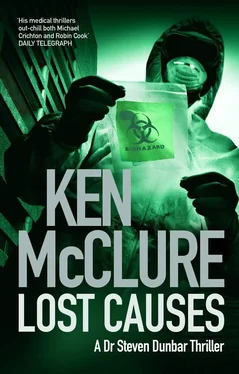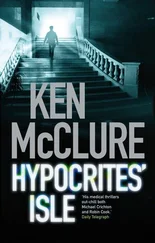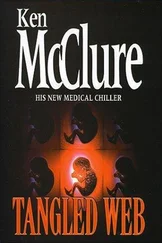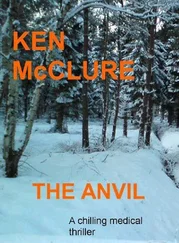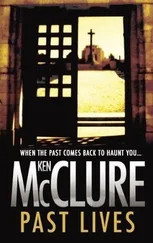Ken McClure - Lost causes
Здесь есть возможность читать онлайн «Ken McClure - Lost causes» весь текст электронной книги совершенно бесплатно (целиком полную версию без сокращений). В некоторых случаях можно слушать аудио, скачать через торрент в формате fb2 и присутствует краткое содержание. Жанр: Триллер, на английском языке. Описание произведения, (предисловие) а так же отзывы посетителей доступны на портале библиотеки ЛибКат.
- Название:Lost causes
- Автор:
- Жанр:
- Год:неизвестен
- ISBN:нет данных
- Рейтинг книги:4 / 5. Голосов: 1
-
Избранное:Добавить в избранное
- Отзывы:
-
Ваша оценка:
- 80
- 1
- 2
- 3
- 4
- 5
Lost causes: краткое содержание, описание и аннотация
Предлагаем к чтению аннотацию, описание, краткое содержание или предисловие (зависит от того, что написал сам автор книги «Lost causes»). Если вы не нашли необходимую информацию о книге — напишите в комментариях, мы постараемся отыскать её.
Lost causes — читать онлайн бесплатно полную книгу (весь текст) целиком
Ниже представлен текст книги, разбитый по страницам. Система сохранения места последней прочитанной страницы, позволяет с удобством читать онлайн бесплатно книгу «Lost causes», без необходимости каждый раз заново искать на чём Вы остановились. Поставьте закладку, и сможете в любой момент перейти на страницу, на которой закончили чтение.
Интервал:
Закладка:
‘She’d be delighted to see you,’ said Jean, putting down the phone. ‘She suggests you join her for coffee at eleven.’
Maxine welcomed Steven and left him admiring the view while she made coffee and returned with everything on a silver tray.
‘How can I help you, Dr Dunbar?’
‘Mrs French, the last time I saw you you very kindly handed over some disks that your husband had been keeping safe.’
‘Yes, government property, you said. Is something wrong?’
Steven still wasn’t sure in his own mind how to approach the problem, but now, faced with the smiling Maxine French, he had to make his decision. He took a sip of coffee. ‘Did anyone else have access to the disks you gave me?’
‘Yes,’ said Maxine, matter of factly, making the word music to Steven’s ears. ‘An executive called round from Deltasoft. He seemed to know about the disks, and said that when he was clearing Charles’s office he had come across the latest versions, which Charles obviously hadn’t had time to bring home. We exchanged them. I’m sorry. I should have mentioned it.’
‘No problem,’ said Steven. ‘No problem at all.’ He felt both relieved and apprehensive. The good thing was that he had made progress: he now knew for sure that Sci-Med had been set up to believe that there had been a plan to reintroduce the old Northern Health Scheme and it had ended with the explosion in Paris. There had never been any such plan, but knowing that now raised many more questions.
‘Did you know the man who came to see you?’
‘No, but he showed me ID. It’s quite a large company,’ said Maxine. ‘And I wasn’t involved in it at all. I think it fair to say I took as much interest in Charles’s computer business as he did in my charities. Not-a-lot, as that chap on the telly used to say.’
Steven smiled and wondered about Maxine’s marriage. He felt sure she’d been a loyal, supportive wife — probably the reason French had married her. She’d ticked all the boxes for service as a top-flight political animal’s wife. He hadn’t been looking for any sort of companion and she, coming from the same sort of background, hadn’t expected to be one.
‘Does the term Schiller Group mean anything to you, Mrs French?’ He watched Maxine carefully for a reaction, but none was visible. She shook her head.
‘Not in any meaningful way,’ she said, a reply that Steven found strange: his facial expression said so. Maxine explained. ‘I remember once at a dinner party we gave, one of the guests mentioned something about the Schiller Group and Charles told him to shut up. I thought it very rude of him but he was clearly very angry. I asked him about it later but he said it was something that didn’t concern me — something he said rather a lot, if truth be told. But then, I suppose that was because of his government involvement?’
Steven gave a knowing nod. ‘The price we all have to pay, I’m afraid, not being able to share things with our loved ones. Thank you, Mrs French. You’ve been a great help.’
He returned to the Home Office, feeling well satisfied with his morning’s work. He was particularly pleased that he’d managed to find out what he wanted to know without alerting anyone to the fact, particularly anyone connected with the Schiller Group.
Steven reflected that this was the first morning since the start of the emergency that there had not been a meeting of COBRA. There was one pencilled in for the following morning — more a case of not wanting to tempt fate by calling a complete halt to them, he suspected — but it was a sign that fear was being replaced by optimism. The epidemic could have been so much worse, as he’d noticed the newspapers were starting to point out when he flicked through the copies on his desk. Some of them were already taking to task the consultant microbiologists across the country who’d been predicting something much more serious.
Steven noticed that they were largely the same experts who’d been asked to pronounce on the swine flu ‘epidemic’, and was reminded of some questions of his own he wanted to ask. He needed to speak to someone about the course of the cholera epidemic and considered calling an old friend at the London School of Hygiene and Tropical Medicine, but then he changed his mind. He needed something more than a strictly academic view. He called Lukas Neubauer at the Lundborg labs instead.
‘Steven, you have some work for me?’
‘Not right now, Lukas. I need to talk.’
‘Talk doesn’t put food in my children’s mouths. We could do with a big, juicy government contract down here. We’re bored stiff doing DNA analyses for paternity suit lawyers and bacteriology reports for councils closing down Chinese restaurants.’
‘Well, it keeps the Merc on the road,’ Steven joked, alluding to the Mercedes Lukas drove.
‘When would you like to come over, my friend?’
‘This afternoon?’
Dr Lukas Neubauer, a tall, Slavic-looking man, welcomed Steven with a smile and a firm handshake. ‘Maybe we can talk in the lab? I’ve got a couple of things on the go.’ Steven perched on a lab stool and rested an elbow on the bench while he waited for Neubauer to transfer a rack of tubes from one water bath to another and start a stop clock. ‘Now, what would you like to talk about?’
‘When you found that the cholera strain was sensitive to antibiotics, what was your first thought?’
Neubauer pushed his glasses up onto his forehead and put his head to one side. ‘I was surprised,’ he said. ‘But relieved too because it suggested the Vibrio had not been genetically altered.’
Neubauer’s reply had been simple and to the point, so he didn’t understand why Steven suddenly appeared spellbound. ‘Steven? Are you all right?’
‘Christ, that’s it.’
‘What’s what?’
‘That’s what we were meant to think. Did Colindale do any further analysis of the bug’s genetic make-up?’
‘I don’t think they did — everyone was so pleased that it was still sensitive to antibiotics. And, of course, it was quickly apparent that the enterotoxin had not been enhanced because people were recovering as long as they were kept hydrated.’
‘Can you get your hands on the bug? I can go through the usual channels but it might be quicker if we bypass them.’
‘I can ask my friend at Colindale. We have a licence to handle dangerous pathogens here so I can’t see any great problem.’
‘I need you to carry out a full analysis of it. Tell me everything you can as quickly as you can. Make it your number one priority.’
‘What are we looking for?’
‘I don’t know.’
TWENTY-NINE
The evening broadcast from the advisory committee urged caution. People must remain on their guard against a disease which could still kill if given the chance. Water supplies were being kept under constant surveillance, but should suspicion be aroused the public were urged to report it quickly to the authorities. Arrangements for vaccination against cholera were proceeding as planned, and it was envisaged that there should only be a gap of around ten days after the first wave of vaccinations before the entire population could be protected. Together they would wash away the evil.
Steven had noticed the new government slogan appearing on posters in the city. Swine flu had had one too: someone in Whitehall believed that all epidemics should have a slogan. His mind strayed to what it might be if weapons-grade smallpox or bubonic plague came to call.
‘Anything in from Lukas?’ Steven asked Jean when he arrived at the Home Office in the morning.
‘Nothing apart from a memo yesterday evening saying that the lab had the strain and would be working on it all night.’
Читать дальшеИнтервал:
Закладка:
Похожие книги на «Lost causes»
Представляем Вашему вниманию похожие книги на «Lost causes» списком для выбора. Мы отобрали схожую по названию и смыслу литературу в надежде предоставить читателям больше вариантов отыскать новые, интересные, ещё непрочитанные произведения.
Обсуждение, отзывы о книге «Lost causes» и просто собственные мнения читателей. Оставьте ваши комментарии, напишите, что Вы думаете о произведении, его смысле или главных героях. Укажите что конкретно понравилось, а что нет, и почему Вы так считаете.
